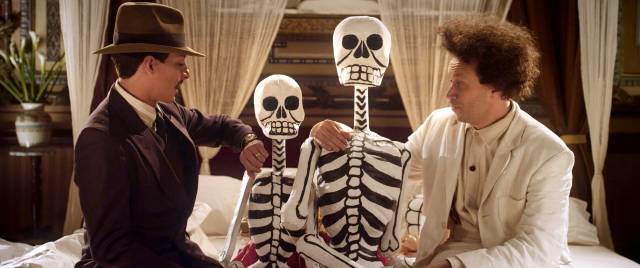
 Irreverent British auteur Peter Greenaway takes on Soviet montage legend Sergei Eisenstein in an expressionist imagining of Eisenstein's trip to Mexico, but the results are disappointingly bland. Officially, Eisenstein was gathering footage for a Mexican epic after a failed attempt at breaking into Hollywood, but Greenaway is more interested in speculation over Eisenstein's sexual awakening at the hands of his married cultural guide, Palomino Canedo.
Irreverent British auteur Peter Greenaway takes on Soviet montage legend Sergei Eisenstein in an expressionist imagining of Eisenstein's trip to Mexico, but the results are disappointingly bland. Officially, Eisenstein was gathering footage for a Mexican epic after a failed attempt at breaking into Hollywood, but Greenaway is more interested in speculation over Eisenstein's sexual awakening at the hands of his married cultural guide, Palomino Canedo.
Uninterested in cohesive biography, the film is a loose imagining of Eisenstein's stay, told by way of wall-to-wall dialogue, theatrical staging and experimental visuals - split screen editing fills us in on historical photographs, interspersed with architectural projections and abstractions. While Greenaway does get mileage from some inventive sets and evocative Mexican iconography, the bulk of his visual innovations feel haphazard and, fatally, lacking in energy. They pale in the shadow of its subject's revolutionary cinematic experiments. One set piece does stand out - a seemingly continuous tracking shot that covers one of Eisenstein's lengthy monologues from three angles.
While the film's many monologues - some purportedly taken from Eisenstein's journals - cover matters of politics, philosophy, death and art, Eisenstein never really emerges as a character, nevermind a genius. What we get instead from Finnish actor Elmer Back, is a petulant, cartoonish, hyperactive man-child from whom it is hard to imagine even five minutes of The Battleship Potemkin emerging. A distracting Russian accent and weak performances from the rest of the cast don't help. Despite liberal nudity and frank copulation which is sure to cause a stir, there is also a painful lack of chemistry between the leading men, leaving their cinematic affair regrettably devoid of heart and soul and solely resigned to the flesh on display.
It is probably unsurprising that no actors, producers or financiers from the infamously homophobic Russia were willing to risk their careers by getting on board. Greenaway presents Eisenstein unequivocally as a repressed homosexual - a virgin at 33 - longing for a sexual awakening, while Russia seems to prefer to leave the lid on speculations over their most celebrated cinematic export's sexuality. In reality, Eisenstein's sexuality is unconfirmed - he married fellow filmmaker Vera Atasheva in 1934 - and seldomly discussed, but speculations are not without merit: Greenaway offers Russian anti-gay laws at the time as context for Eisensein's marriage and points to the homo-erotic imagery at the front end of The Battleship Potemkin (shirtless sailors glancing across hammocks intercut with rising canons). Perhaps more substantially, his film also alludes to the erotic sketches and photos of nude men that were found in Eisenstein's luggage during his trip to America. Whatever the case may have been, Greenaway's film is an unapologetic imagining of a turning point in one of cinema's most significant artist's life and career. It's just disappointing the results are fairly uninspiring.